BUS203 Business Law and Ethics: Consumer Rights and Guarantees Report
VerifiedAdded on 2022/12/27
|10
|2620
|99
Report
AI Summary
This report provides a comprehensive analysis of Australian Consumer Law (ACL), specifically addressing consumer rights and statutory guarantees concerning the supply of goods. It examines the key provisions, including the guarantee of fitness for a particular disclosed purpose (Section 55), the guarantee of acceptable quality (Section 54), and the guarantee for goods supplied by description (Section 56). The report delves into the concept of a 'consumer' under the ACL, electronic transactions, and remedies available in case of a breach of these guarantees, particularly focusing on major failures as defined in Section 260 of the Act. Additionally, the report addresses the rights of gift recipients (Section 266) and liabilities related to misleading and false representations (Section 151). The report applies these legal principles to a case scenario involving a consumer who purchased various products online, including a hair straightener, an air fryer, and a t-shirt. The analysis explores the implications of each purchase under the ACL, considering whether the supplier, an online retailer, met its obligations, and whether the consumer is entitled to remedies. The report concludes by summarizing the findings and highlighting the importance of consumer protection under the ACL.
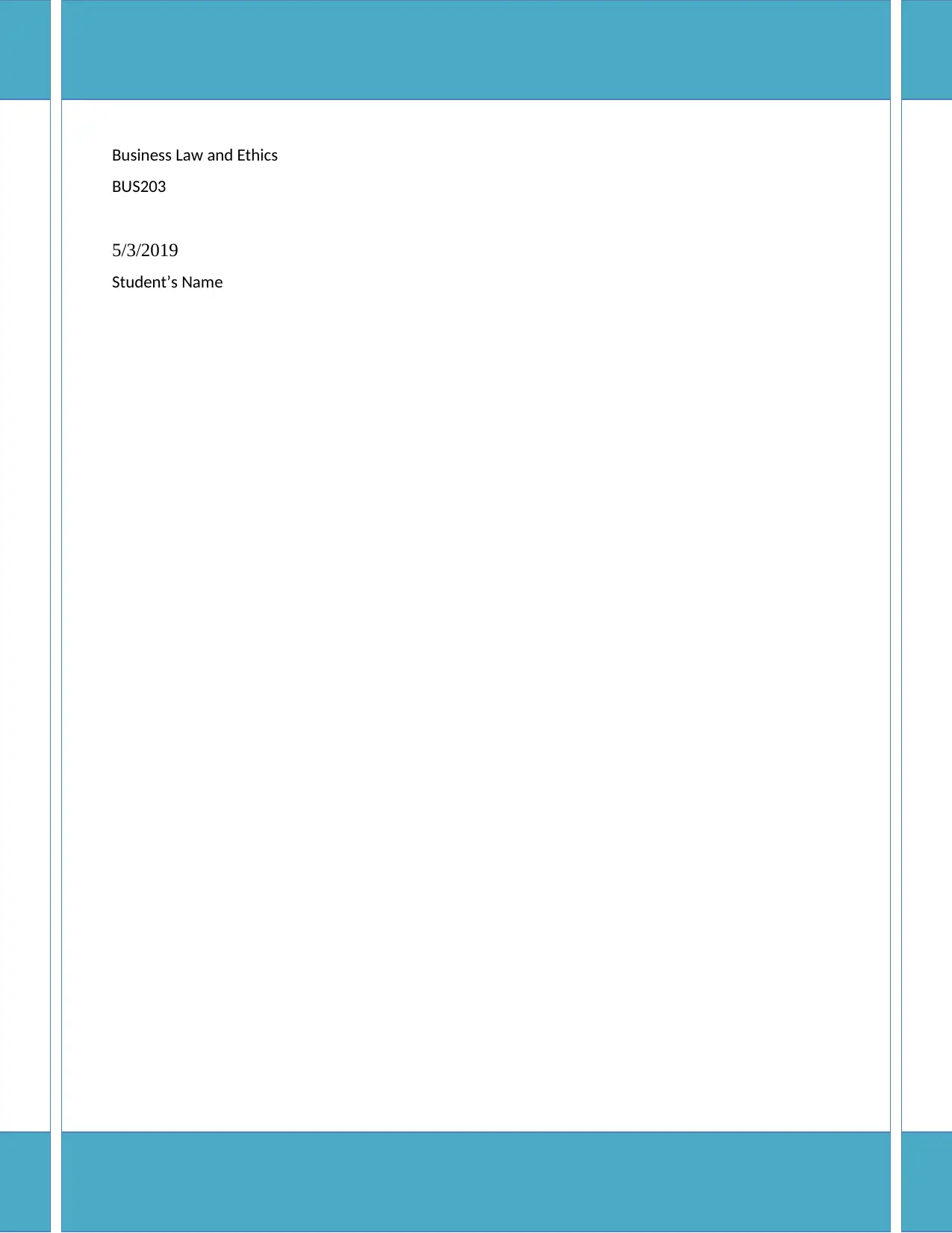
Running Head: BUSINESS AND CORPORATION LAW 0
Business Law and Ethics
BUS203
5/3/2019
Student’s Name
Business Law and Ethics
BUS203
5/3/2019
Student’s Name
Paraphrase This Document
Need a fresh take? Get an instant paraphrase of this document with our AI Paraphraser
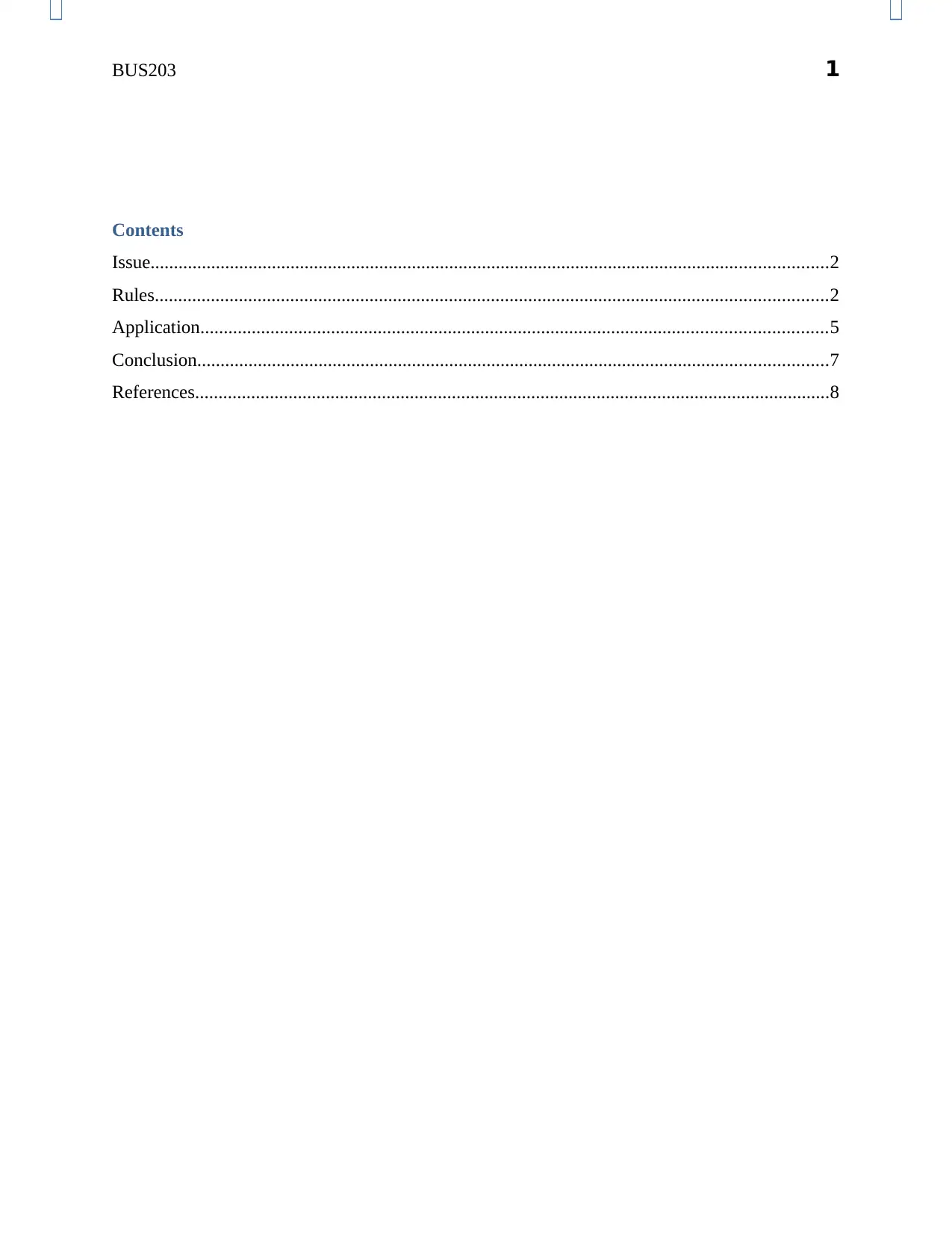
BUS203 1
Contents
Issue.................................................................................................................................................2
Rules................................................................................................................................................2
Application......................................................................................................................................5
Conclusion.......................................................................................................................................7
References........................................................................................................................................8
Contents
Issue.................................................................................................................................................2
Rules................................................................................................................................................2
Application......................................................................................................................................5
Conclusion.......................................................................................................................................7
References........................................................................................................................................8
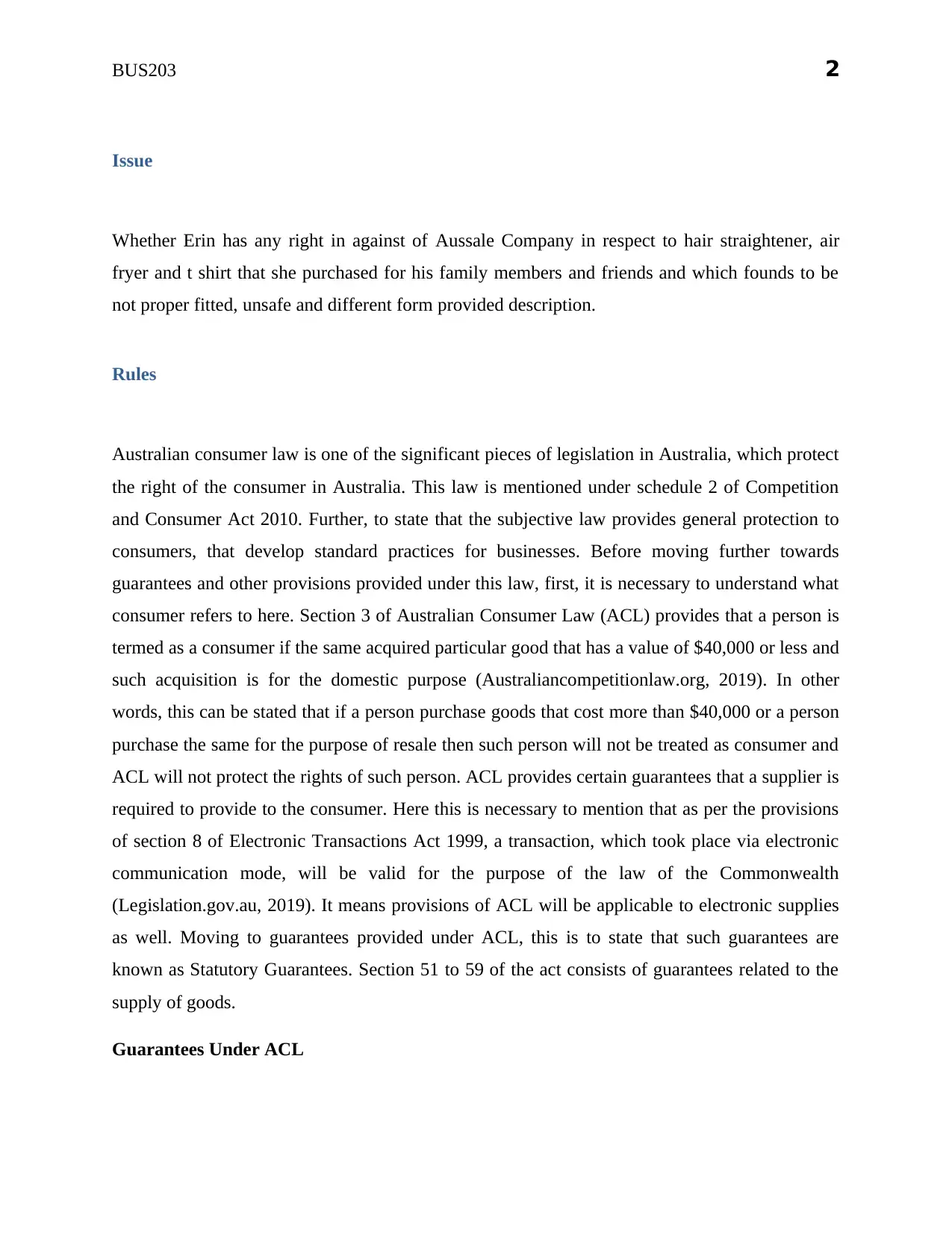
BUS203 2
Issue
Whether Erin has any right in against of Aussale Company in respect to hair straightener, air
fryer and t shirt that she purchased for his family members and friends and which founds to be
not proper fitted, unsafe and different form provided description.
Rules
Australian consumer law is one of the significant pieces of legislation in Australia, which protect
the right of the consumer in Australia. This law is mentioned under schedule 2 of Competition
and Consumer Act 2010. Further, to state that the subjective law provides general protection to
consumers, that develop standard practices for businesses. Before moving further towards
guarantees and other provisions provided under this law, first, it is necessary to understand what
consumer refers to here. Section 3 of Australian Consumer Law (ACL) provides that a person is
termed as a consumer if the same acquired particular good that has a value of $40,000 or less and
such acquisition is for the domestic purpose (Australiancompetitionlaw.org, 2019). In other
words, this can be stated that if a person purchase goods that cost more than $40,000 or a person
purchase the same for the purpose of resale then such person will not be treated as consumer and
ACL will not protect the rights of such person. ACL provides certain guarantees that a supplier is
required to provide to the consumer. Here this is necessary to mention that as per the provisions
of section 8 of Electronic Transactions Act 1999, a transaction, which took place via electronic
communication mode, will be valid for the purpose of the law of the Commonwealth
(Legislation.gov.au, 2019). It means provisions of ACL will be applicable to electronic supplies
as well. Moving to guarantees provided under ACL, this is to state that such guarantees are
known as Statutory Guarantees. Section 51 to 59 of the act consists of guarantees related to the
supply of goods.
Guarantees Under ACL
Issue
Whether Erin has any right in against of Aussale Company in respect to hair straightener, air
fryer and t shirt that she purchased for his family members and friends and which founds to be
not proper fitted, unsafe and different form provided description.
Rules
Australian consumer law is one of the significant pieces of legislation in Australia, which protect
the right of the consumer in Australia. This law is mentioned under schedule 2 of Competition
and Consumer Act 2010. Further, to state that the subjective law provides general protection to
consumers, that develop standard practices for businesses. Before moving further towards
guarantees and other provisions provided under this law, first, it is necessary to understand what
consumer refers to here. Section 3 of Australian Consumer Law (ACL) provides that a person is
termed as a consumer if the same acquired particular good that has a value of $40,000 or less and
such acquisition is for the domestic purpose (Australiancompetitionlaw.org, 2019). In other
words, this can be stated that if a person purchase goods that cost more than $40,000 or a person
purchase the same for the purpose of resale then such person will not be treated as consumer and
ACL will not protect the rights of such person. ACL provides certain guarantees that a supplier is
required to provide to the consumer. Here this is necessary to mention that as per the provisions
of section 8 of Electronic Transactions Act 1999, a transaction, which took place via electronic
communication mode, will be valid for the purpose of the law of the Commonwealth
(Legislation.gov.au, 2019). It means provisions of ACL will be applicable to electronic supplies
as well. Moving to guarantees provided under ACL, this is to state that such guarantees are
known as Statutory Guarantees. Section 51 to 59 of the act consists of guarantees related to the
supply of goods.
Guarantees Under ACL
⊘ This is a preview!⊘
Do you want full access?
Subscribe today to unlock all pages.

Trusted by 1+ million students worldwide
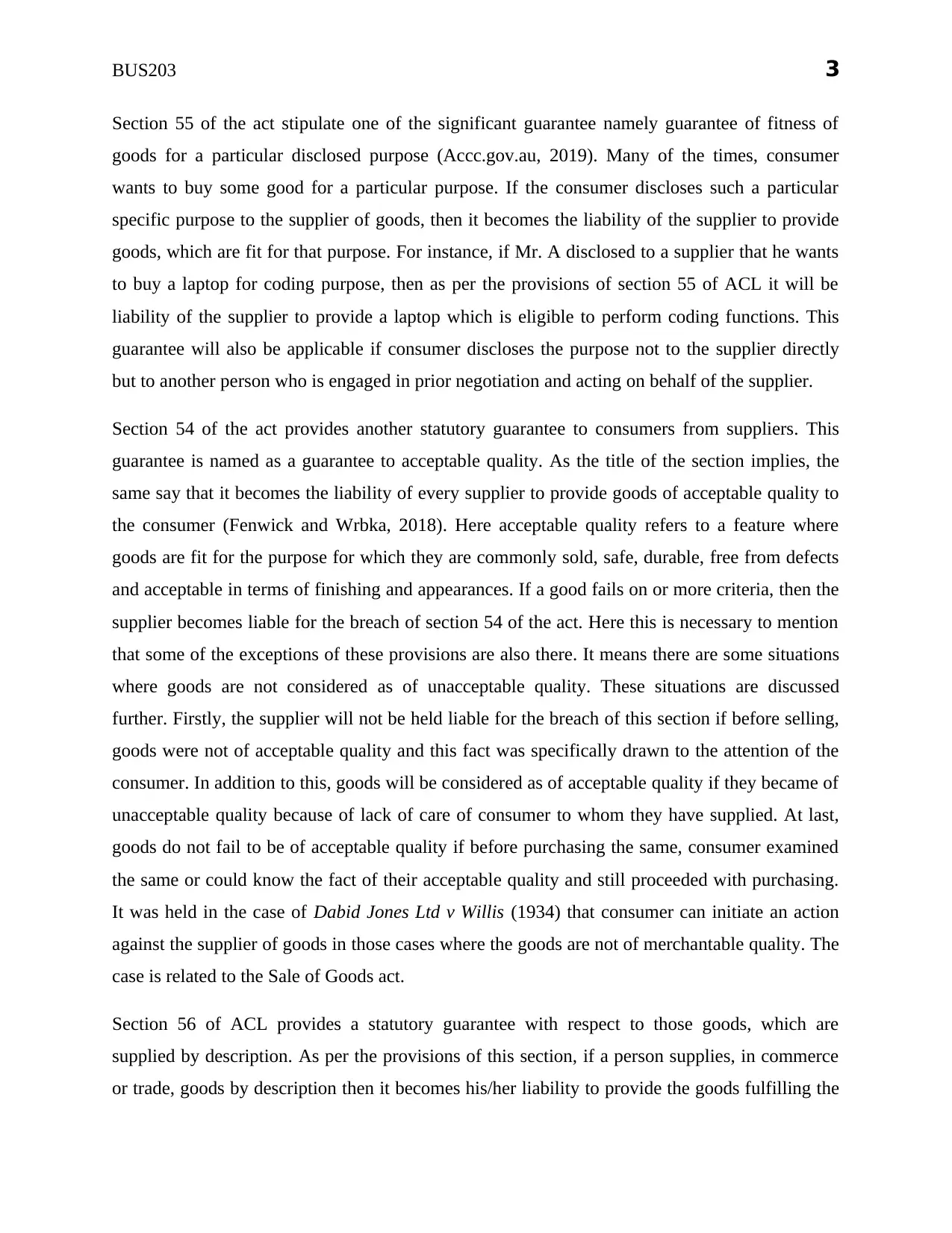
BUS203 3
Section 55 of the act stipulate one of the significant guarantee namely guarantee of fitness of
goods for a particular disclosed purpose (Accc.gov.au, 2019). Many of the times, consumer
wants to buy some good for a particular purpose. If the consumer discloses such a particular
specific purpose to the supplier of goods, then it becomes the liability of the supplier to provide
goods, which are fit for that purpose. For instance, if Mr. A disclosed to a supplier that he wants
to buy a laptop for coding purpose, then as per the provisions of section 55 of ACL it will be
liability of the supplier to provide a laptop which is eligible to perform coding functions. This
guarantee will also be applicable if consumer discloses the purpose not to the supplier directly
but to another person who is engaged in prior negotiation and acting on behalf of the supplier.
Section 54 of the act provides another statutory guarantee to consumers from suppliers. This
guarantee is named as a guarantee to acceptable quality. As the title of the section implies, the
same say that it becomes the liability of every supplier to provide goods of acceptable quality to
the consumer (Fenwick and Wrbka, 2018). Here acceptable quality refers to a feature where
goods are fit for the purpose for which they are commonly sold, safe, durable, free from defects
and acceptable in terms of finishing and appearances. If a good fails on or more criteria, then the
supplier becomes liable for the breach of section 54 of the act. Here this is necessary to mention
that some of the exceptions of these provisions are also there. It means there are some situations
where goods are not considered as of unacceptable quality. These situations are discussed
further. Firstly, the supplier will not be held liable for the breach of this section if before selling,
goods were not of acceptable quality and this fact was specifically drawn to the attention of the
consumer. In addition to this, goods will be considered as of acceptable quality if they became of
unacceptable quality because of lack of care of consumer to whom they have supplied. At last,
goods do not fail to be of acceptable quality if before purchasing the same, consumer examined
the same or could know the fact of their acceptable quality and still proceeded with purchasing.
It was held in the case of Dabid Jones Ltd v Willis (1934) that consumer can initiate an action
against the supplier of goods in those cases where the goods are not of merchantable quality. The
case is related to the Sale of Goods act.
Section 56 of ACL provides a statutory guarantee with respect to those goods, which are
supplied by description. As per the provisions of this section, if a person supplies, in commerce
or trade, goods by description then it becomes his/her liability to provide the goods fulfilling the
Section 55 of the act stipulate one of the significant guarantee namely guarantee of fitness of
goods for a particular disclosed purpose (Accc.gov.au, 2019). Many of the times, consumer
wants to buy some good for a particular purpose. If the consumer discloses such a particular
specific purpose to the supplier of goods, then it becomes the liability of the supplier to provide
goods, which are fit for that purpose. For instance, if Mr. A disclosed to a supplier that he wants
to buy a laptop for coding purpose, then as per the provisions of section 55 of ACL it will be
liability of the supplier to provide a laptop which is eligible to perform coding functions. This
guarantee will also be applicable if consumer discloses the purpose not to the supplier directly
but to another person who is engaged in prior negotiation and acting on behalf of the supplier.
Section 54 of the act provides another statutory guarantee to consumers from suppliers. This
guarantee is named as a guarantee to acceptable quality. As the title of the section implies, the
same say that it becomes the liability of every supplier to provide goods of acceptable quality to
the consumer (Fenwick and Wrbka, 2018). Here acceptable quality refers to a feature where
goods are fit for the purpose for which they are commonly sold, safe, durable, free from defects
and acceptable in terms of finishing and appearances. If a good fails on or more criteria, then the
supplier becomes liable for the breach of section 54 of the act. Here this is necessary to mention
that some of the exceptions of these provisions are also there. It means there are some situations
where goods are not considered as of unacceptable quality. These situations are discussed
further. Firstly, the supplier will not be held liable for the breach of this section if before selling,
goods were not of acceptable quality and this fact was specifically drawn to the attention of the
consumer. In addition to this, goods will be considered as of acceptable quality if they became of
unacceptable quality because of lack of care of consumer to whom they have supplied. At last,
goods do not fail to be of acceptable quality if before purchasing the same, consumer examined
the same or could know the fact of their acceptable quality and still proceeded with purchasing.
It was held in the case of Dabid Jones Ltd v Willis (1934) that consumer can initiate an action
against the supplier of goods in those cases where the goods are not of merchantable quality. The
case is related to the Sale of Goods act.
Section 56 of ACL provides a statutory guarantee with respect to those goods, which are
supplied by description. As per the provisions of this section, if a person supplies, in commerce
or trade, goods by description then it becomes his/her liability to provide the goods fulfilling the
Paraphrase This Document
Need a fresh take? Get an instant paraphrase of this document with our AI Paraphraser
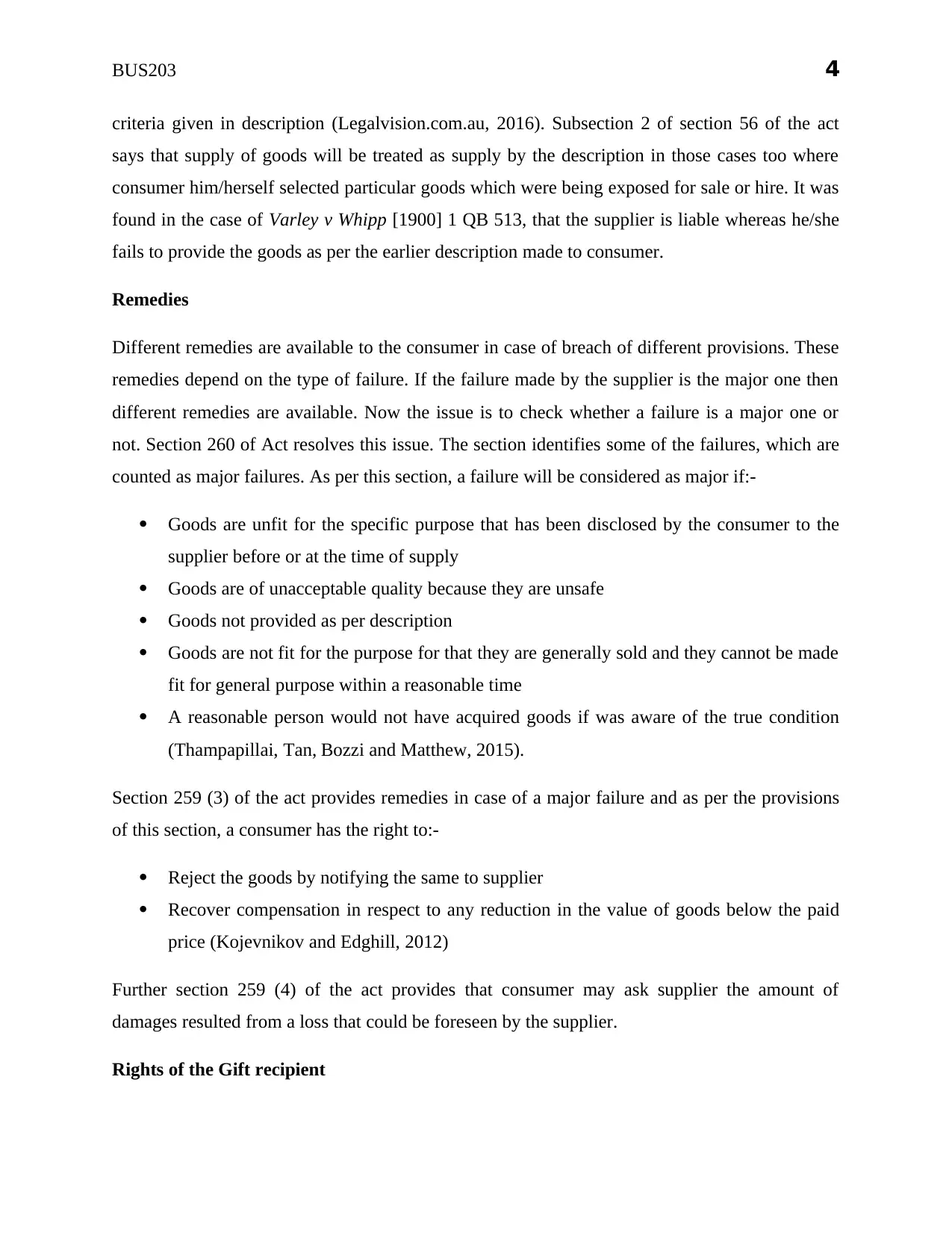
BUS203 4
criteria given in description (Legalvision.com.au, 2016). Subsection 2 of section 56 of the act
says that supply of goods will be treated as supply by the description in those cases too where
consumer him/herself selected particular goods which were being exposed for sale or hire. It was
found in the case of Varley v Whipp [1900] 1 QB 513, that the supplier is liable whereas he/she
fails to provide the goods as per the earlier description made to consumer.
Remedies
Different remedies are available to the consumer in case of breach of different provisions. These
remedies depend on the type of failure. If the failure made by the supplier is the major one then
different remedies are available. Now the issue is to check whether a failure is a major one or
not. Section 260 of Act resolves this issue. The section identifies some of the failures, which are
counted as major failures. As per this section, a failure will be considered as major if:-
Goods are unfit for the specific purpose that has been disclosed by the consumer to the
supplier before or at the time of supply
Goods are of unacceptable quality because they are unsafe
Goods not provided as per description
Goods are not fit for the purpose for that they are generally sold and they cannot be made
fit for general purpose within a reasonable time
A reasonable person would not have acquired goods if was aware of the true condition
(Thampapillai, Tan, Bozzi and Matthew, 2015).
Section 259 (3) of the act provides remedies in case of a major failure and as per the provisions
of this section, a consumer has the right to:-
Reject the goods by notifying the same to supplier
Recover compensation in respect to any reduction in the value of goods below the paid
price (Kojevnikov and Edghill, 2012)
Further section 259 (4) of the act provides that consumer may ask supplier the amount of
damages resulted from a loss that could be foreseen by the supplier.
Rights of the Gift recipient
criteria given in description (Legalvision.com.au, 2016). Subsection 2 of section 56 of the act
says that supply of goods will be treated as supply by the description in those cases too where
consumer him/herself selected particular goods which were being exposed for sale or hire. It was
found in the case of Varley v Whipp [1900] 1 QB 513, that the supplier is liable whereas he/she
fails to provide the goods as per the earlier description made to consumer.
Remedies
Different remedies are available to the consumer in case of breach of different provisions. These
remedies depend on the type of failure. If the failure made by the supplier is the major one then
different remedies are available. Now the issue is to check whether a failure is a major one or
not. Section 260 of Act resolves this issue. The section identifies some of the failures, which are
counted as major failures. As per this section, a failure will be considered as major if:-
Goods are unfit for the specific purpose that has been disclosed by the consumer to the
supplier before or at the time of supply
Goods are of unacceptable quality because they are unsafe
Goods not provided as per description
Goods are not fit for the purpose for that they are generally sold and they cannot be made
fit for general purpose within a reasonable time
A reasonable person would not have acquired goods if was aware of the true condition
(Thampapillai, Tan, Bozzi and Matthew, 2015).
Section 259 (3) of the act provides remedies in case of a major failure and as per the provisions
of this section, a consumer has the right to:-
Reject the goods by notifying the same to supplier
Recover compensation in respect to any reduction in the value of goods below the paid
price (Kojevnikov and Edghill, 2012)
Further section 259 (4) of the act provides that consumer may ask supplier the amount of
damages resulted from a loss that could be foreseen by the supplier.
Rights of the Gift recipient
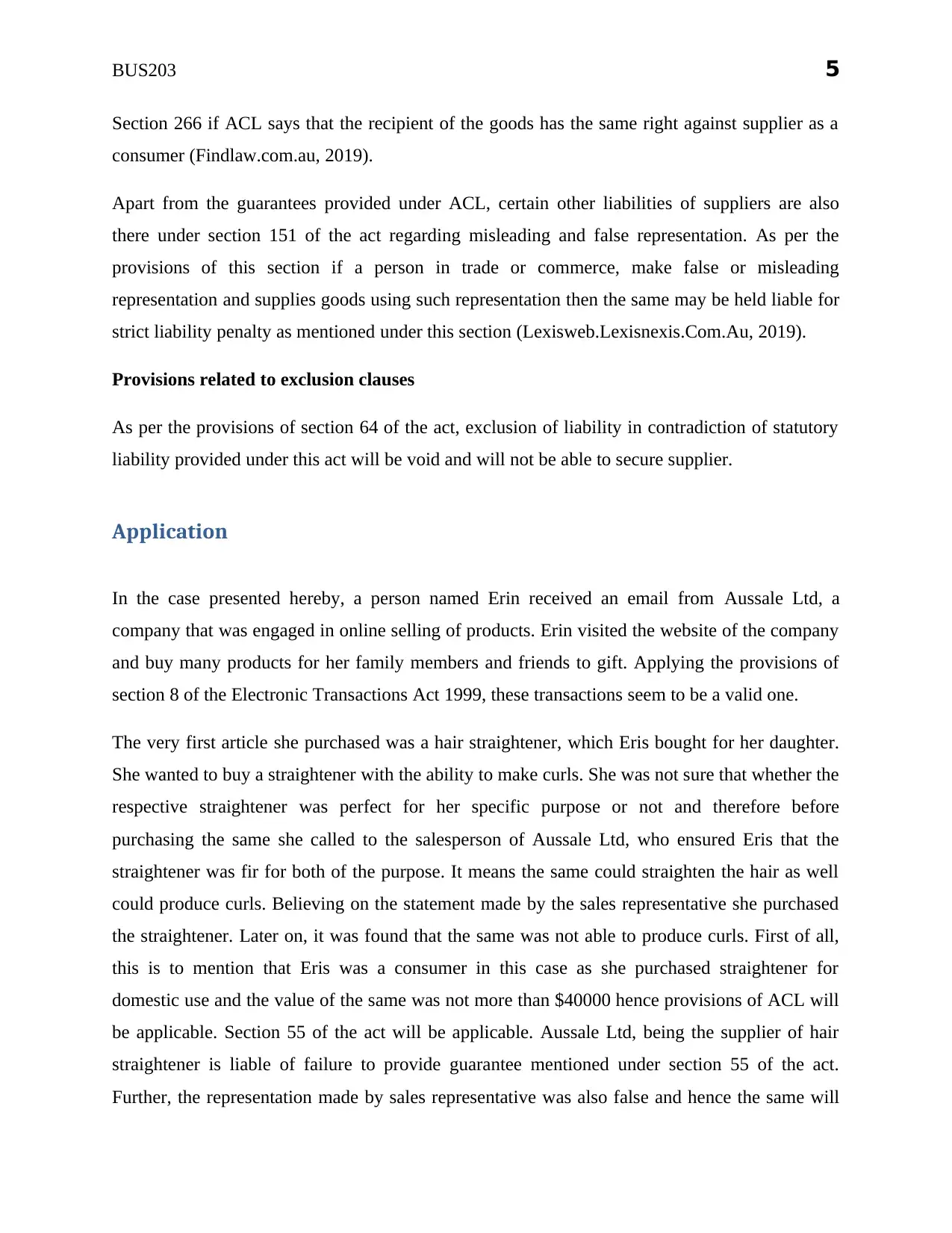
BUS203 5
Section 266 if ACL says that the recipient of the goods has the same right against supplier as a
consumer (Findlaw.com.au, 2019).
Apart from the guarantees provided under ACL, certain other liabilities of suppliers are also
there under section 151 of the act regarding misleading and false representation. As per the
provisions of this section if a person in trade or commerce, make false or misleading
representation and supplies goods using such representation then the same may be held liable for
strict liability penalty as mentioned under this section (Lexisweb.Lexisnexis.Com.Au, 2019).
Provisions related to exclusion clauses
As per the provisions of section 64 of the act, exclusion of liability in contradiction of statutory
liability provided under this act will be void and will not be able to secure supplier.
Application
In the case presented hereby, a person named Erin received an email from Aussale Ltd, a
company that was engaged in online selling of products. Erin visited the website of the company
and buy many products for her family members and friends to gift. Applying the provisions of
section 8 of the Electronic Transactions Act 1999, these transactions seem to be a valid one.
The very first article she purchased was a hair straightener, which Eris bought for her daughter.
She wanted to buy a straightener with the ability to make curls. She was not sure that whether the
respective straightener was perfect for her specific purpose or not and therefore before
purchasing the same she called to the salesperson of Aussale Ltd, who ensured Eris that the
straightener was fir for both of the purpose. It means the same could straighten the hair as well
could produce curls. Believing on the statement made by the sales representative she purchased
the straightener. Later on, it was found that the same was not able to produce curls. First of all,
this is to mention that Eris was a consumer in this case as she purchased straightener for
domestic use and the value of the same was not more than $40000 hence provisions of ACL will
be applicable. Section 55 of the act will be applicable. Aussale Ltd, being the supplier of hair
straightener is liable of failure to provide guarantee mentioned under section 55 of the act.
Further, the representation made by sales representative was also false and hence the same will
Section 266 if ACL says that the recipient of the goods has the same right against supplier as a
consumer (Findlaw.com.au, 2019).
Apart from the guarantees provided under ACL, certain other liabilities of suppliers are also
there under section 151 of the act regarding misleading and false representation. As per the
provisions of this section if a person in trade or commerce, make false or misleading
representation and supplies goods using such representation then the same may be held liable for
strict liability penalty as mentioned under this section (Lexisweb.Lexisnexis.Com.Au, 2019).
Provisions related to exclusion clauses
As per the provisions of section 64 of the act, exclusion of liability in contradiction of statutory
liability provided under this act will be void and will not be able to secure supplier.
Application
In the case presented hereby, a person named Erin received an email from Aussale Ltd, a
company that was engaged in online selling of products. Erin visited the website of the company
and buy many products for her family members and friends to gift. Applying the provisions of
section 8 of the Electronic Transactions Act 1999, these transactions seem to be a valid one.
The very first article she purchased was a hair straightener, which Eris bought for her daughter.
She wanted to buy a straightener with the ability to make curls. She was not sure that whether the
respective straightener was perfect for her specific purpose or not and therefore before
purchasing the same she called to the salesperson of Aussale Ltd, who ensured Eris that the
straightener was fir for both of the purpose. It means the same could straighten the hair as well
could produce curls. Believing on the statement made by the sales representative she purchased
the straightener. Later on, it was found that the same was not able to produce curls. First of all,
this is to mention that Eris was a consumer in this case as she purchased straightener for
domestic use and the value of the same was not more than $40000 hence provisions of ACL will
be applicable. Section 55 of the act will be applicable. Aussale Ltd, being the supplier of hair
straightener is liable of failure to provide guarantee mentioned under section 55 of the act.
Further, the representation made by sales representative was also false and hence the same will
⊘ This is a preview!⊘
Do you want full access?
Subscribe today to unlock all pages.

Trusted by 1+ million students worldwide
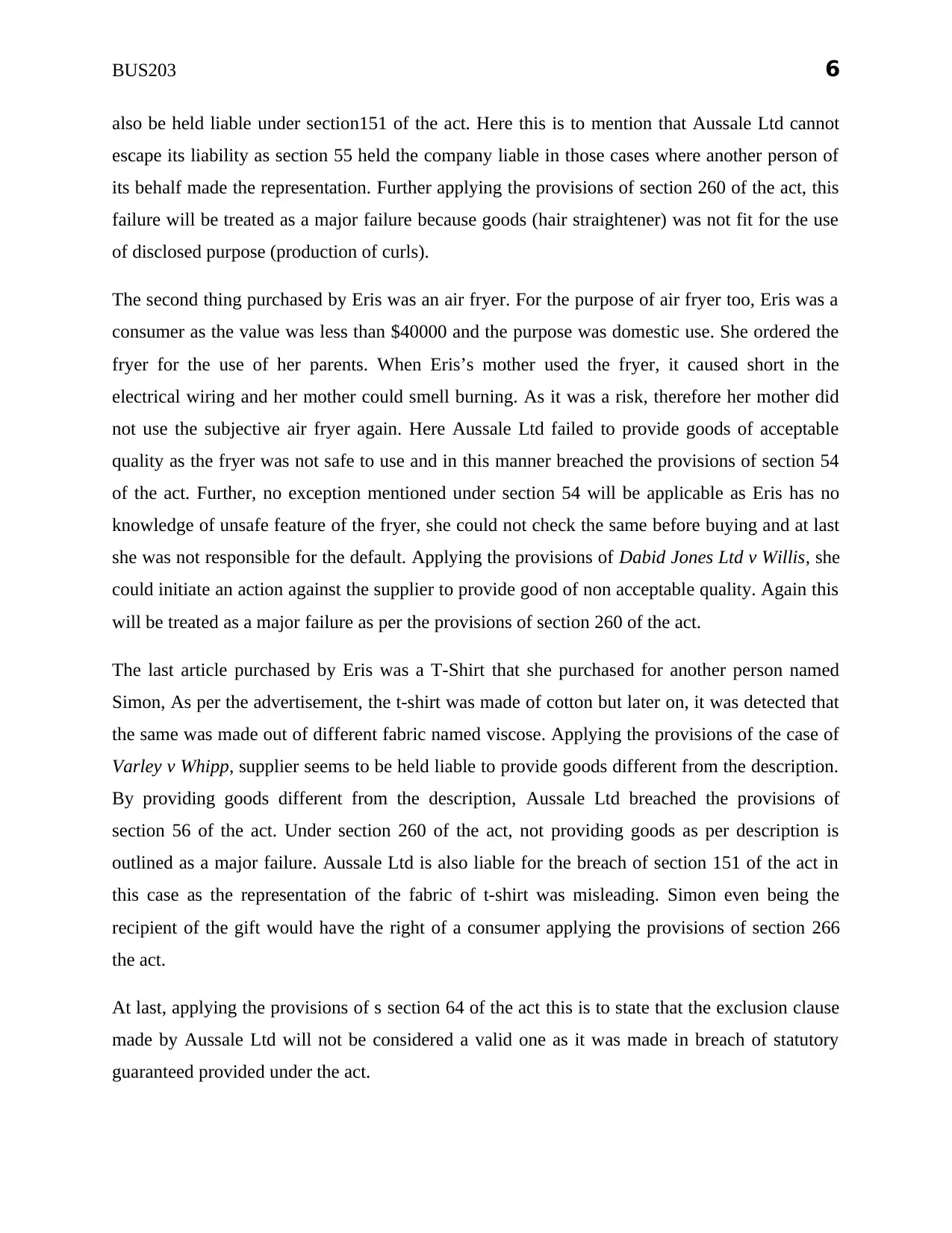
BUS203 6
also be held liable under section151 of the act. Here this is to mention that Aussale Ltd cannot
escape its liability as section 55 held the company liable in those cases where another person of
its behalf made the representation. Further applying the provisions of section 260 of the act, this
failure will be treated as a major failure because goods (hair straightener) was not fit for the use
of disclosed purpose (production of curls).
The second thing purchased by Eris was an air fryer. For the purpose of air fryer too, Eris was a
consumer as the value was less than $40000 and the purpose was domestic use. She ordered the
fryer for the use of her parents. When Eris’s mother used the fryer, it caused short in the
electrical wiring and her mother could smell burning. As it was a risk, therefore her mother did
not use the subjective air fryer again. Here Aussale Ltd failed to provide goods of acceptable
quality as the fryer was not safe to use and in this manner breached the provisions of section 54
of the act. Further, no exception mentioned under section 54 will be applicable as Eris has no
knowledge of unsafe feature of the fryer, she could not check the same before buying and at last
she was not responsible for the default. Applying the provisions of Dabid Jones Ltd v Willis, she
could initiate an action against the supplier to provide good of non acceptable quality. Again this
will be treated as a major failure as per the provisions of section 260 of the act.
The last article purchased by Eris was a T-Shirt that she purchased for another person named
Simon, As per the advertisement, the t-shirt was made of cotton but later on, it was detected that
the same was made out of different fabric named viscose. Applying the provisions of the case of
Varley v Whipp, supplier seems to be held liable to provide goods different from the description.
By providing goods different from the description, Aussale Ltd breached the provisions of
section 56 of the act. Under section 260 of the act, not providing goods as per description is
outlined as a major failure. Aussale Ltd is also liable for the breach of section 151 of the act in
this case as the representation of the fabric of t-shirt was misleading. Simon even being the
recipient of the gift would have the right of a consumer applying the provisions of section 266
the act.
At last, applying the provisions of s section 64 of the act this is to state that the exclusion clause
made by Aussale Ltd will not be considered a valid one as it was made in breach of statutory
guaranteed provided under the act.
also be held liable under section151 of the act. Here this is to mention that Aussale Ltd cannot
escape its liability as section 55 held the company liable in those cases where another person of
its behalf made the representation. Further applying the provisions of section 260 of the act, this
failure will be treated as a major failure because goods (hair straightener) was not fit for the use
of disclosed purpose (production of curls).
The second thing purchased by Eris was an air fryer. For the purpose of air fryer too, Eris was a
consumer as the value was less than $40000 and the purpose was domestic use. She ordered the
fryer for the use of her parents. When Eris’s mother used the fryer, it caused short in the
electrical wiring and her mother could smell burning. As it was a risk, therefore her mother did
not use the subjective air fryer again. Here Aussale Ltd failed to provide goods of acceptable
quality as the fryer was not safe to use and in this manner breached the provisions of section 54
of the act. Further, no exception mentioned under section 54 will be applicable as Eris has no
knowledge of unsafe feature of the fryer, she could not check the same before buying and at last
she was not responsible for the default. Applying the provisions of Dabid Jones Ltd v Willis, she
could initiate an action against the supplier to provide good of non acceptable quality. Again this
will be treated as a major failure as per the provisions of section 260 of the act.
The last article purchased by Eris was a T-Shirt that she purchased for another person named
Simon, As per the advertisement, the t-shirt was made of cotton but later on, it was detected that
the same was made out of different fabric named viscose. Applying the provisions of the case of
Varley v Whipp, supplier seems to be held liable to provide goods different from the description.
By providing goods different from the description, Aussale Ltd breached the provisions of
section 56 of the act. Under section 260 of the act, not providing goods as per description is
outlined as a major failure. Aussale Ltd is also liable for the breach of section 151 of the act in
this case as the representation of the fabric of t-shirt was misleading. Simon even being the
recipient of the gift would have the right of a consumer applying the provisions of section 266
the act.
At last, applying the provisions of s section 64 of the act this is to state that the exclusion clause
made by Aussale Ltd will not be considered a valid one as it was made in breach of statutory
guaranteed provided under the act.
Paraphrase This Document
Need a fresh take? Get an instant paraphrase of this document with our AI Paraphraser
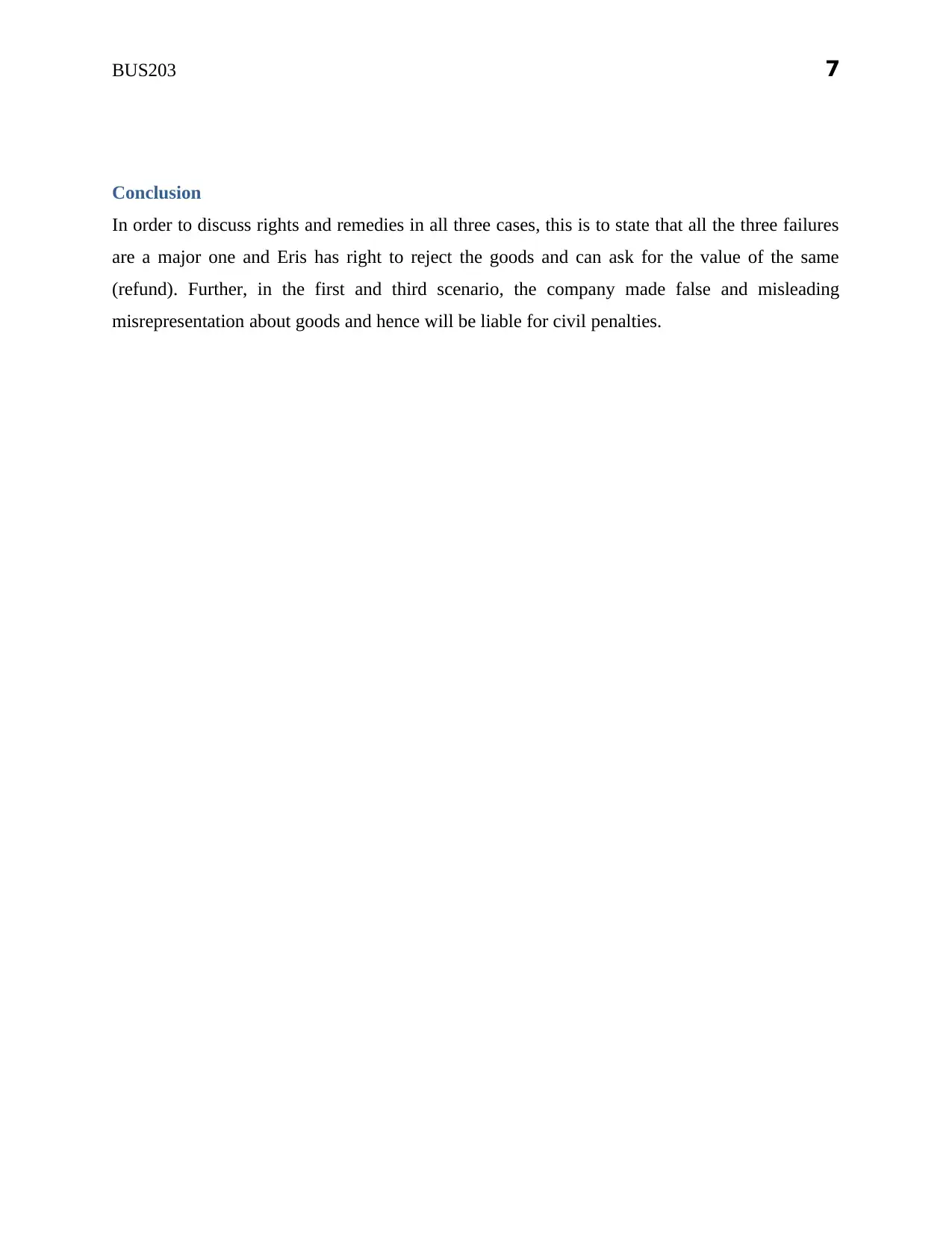
BUS203 7
Conclusion
In order to discuss rights and remedies in all three cases, this is to state that all the three failures
are a major one and Eris has right to reject the goods and can ask for the value of the same
(refund). Further, in the first and third scenario, the company made false and misleading
misrepresentation about goods and hence will be liable for civil penalties.
Conclusion
In order to discuss rights and remedies in all three cases, this is to state that all the three failures
are a major one and Eris has right to reject the goods and can ask for the value of the same
(refund). Further, in the first and third scenario, the company made false and misleading
misrepresentation about goods and hence will be liable for civil penalties.
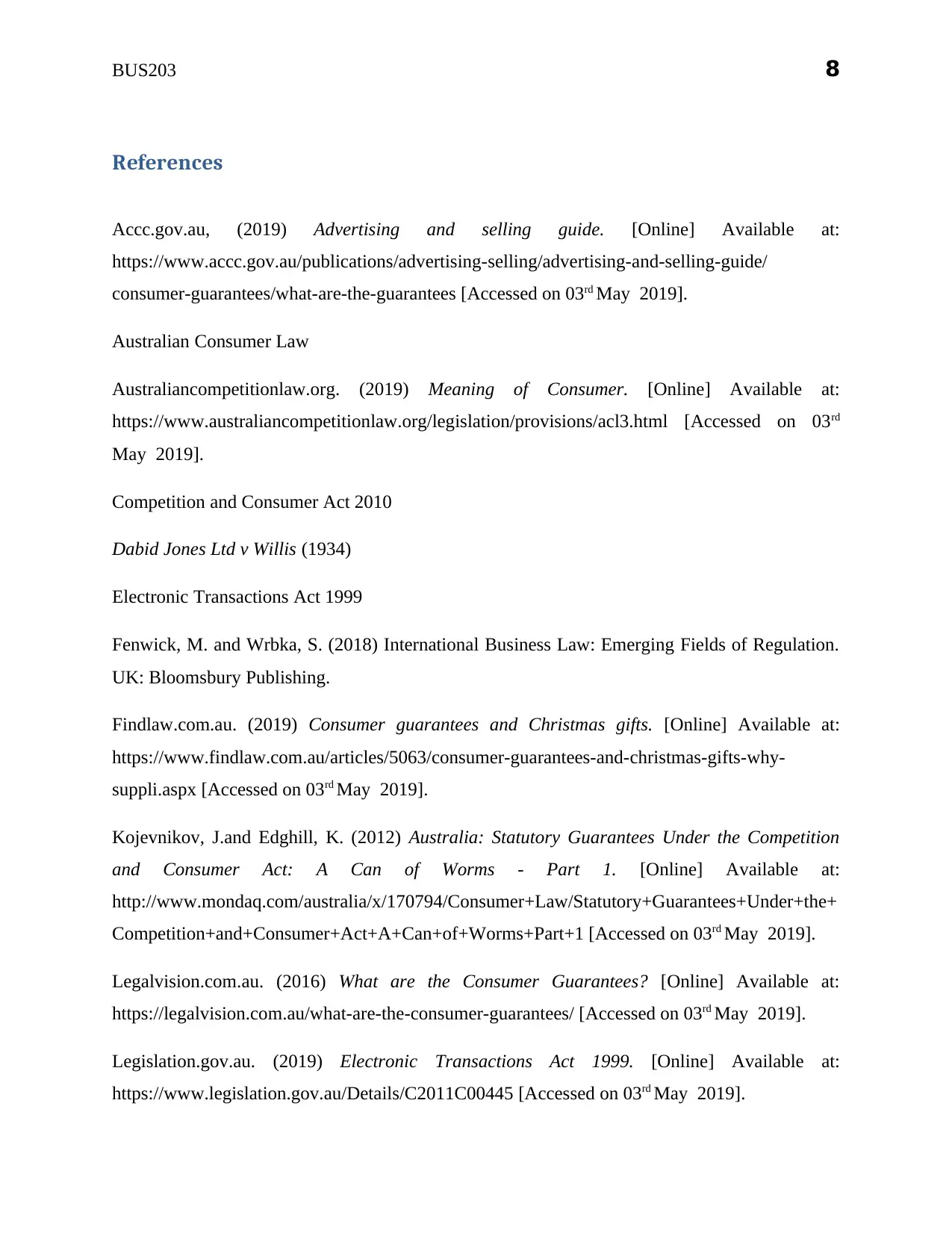
BUS203 8
References
Accc.gov.au, (2019) Advertising and selling guide. [Online] Available at:
https://www.accc.gov.au/publications/advertising-selling/advertising-and-selling-guide/
consumer-guarantees/what-are-the-guarantees [Accessed on 03rd May 2019].
Australian Consumer Law
Australiancompetitionlaw.org. (2019) Meaning of Consumer. [Online] Available at:
https://www.australiancompetitionlaw.org/legislation/provisions/acl3.html [Accessed on 03rd
May 2019].
Competition and Consumer Act 2010
Dabid Jones Ltd v Willis (1934)
Electronic Transactions Act 1999
Fenwick, M. and Wrbka, S. (2018) International Business Law: Emerging Fields of Regulation.
UK: Bloomsbury Publishing.
Findlaw.com.au. (2019) Consumer guarantees and Christmas gifts. [Online] Available at:
https://www.findlaw.com.au/articles/5063/consumer-guarantees-and-christmas-gifts-why-
suppli.aspx [Accessed on 03rd May 2019].
Kojevnikov, J.and Edghill, K. (2012) Australia: Statutory Guarantees Under the Competition
and Consumer Act: A Can of Worms - Part 1. [Online] Available at:
http://www.mondaq.com/australia/x/170794/Consumer+Law/Statutory+Guarantees+Under+the+
Competition+and+Consumer+Act+A+Can+of+Worms+Part+1 [Accessed on 03rd May 2019].
Legalvision.com.au. (2016) What are the Consumer Guarantees? [Online] Available at:
https://legalvision.com.au/what-are-the-consumer-guarantees/ [Accessed on 03rd May 2019].
Legislation.gov.au. (2019) Electronic Transactions Act 1999. [Online] Available at:
https://www.legislation.gov.au/Details/C2011C00445 [Accessed on 03rd May 2019].
References
Accc.gov.au, (2019) Advertising and selling guide. [Online] Available at:
https://www.accc.gov.au/publications/advertising-selling/advertising-and-selling-guide/
consumer-guarantees/what-are-the-guarantees [Accessed on 03rd May 2019].
Australian Consumer Law
Australiancompetitionlaw.org. (2019) Meaning of Consumer. [Online] Available at:
https://www.australiancompetitionlaw.org/legislation/provisions/acl3.html [Accessed on 03rd
May 2019].
Competition and Consumer Act 2010
Dabid Jones Ltd v Willis (1934)
Electronic Transactions Act 1999
Fenwick, M. and Wrbka, S. (2018) International Business Law: Emerging Fields of Regulation.
UK: Bloomsbury Publishing.
Findlaw.com.au. (2019) Consumer guarantees and Christmas gifts. [Online] Available at:
https://www.findlaw.com.au/articles/5063/consumer-guarantees-and-christmas-gifts-why-
suppli.aspx [Accessed on 03rd May 2019].
Kojevnikov, J.and Edghill, K. (2012) Australia: Statutory Guarantees Under the Competition
and Consumer Act: A Can of Worms - Part 1. [Online] Available at:
http://www.mondaq.com/australia/x/170794/Consumer+Law/Statutory+Guarantees+Under+the+
Competition+and+Consumer+Act+A+Can+of+Worms+Part+1 [Accessed on 03rd May 2019].
Legalvision.com.au. (2016) What are the Consumer Guarantees? [Online] Available at:
https://legalvision.com.au/what-are-the-consumer-guarantees/ [Accessed on 03rd May 2019].
Legislation.gov.au. (2019) Electronic Transactions Act 1999. [Online] Available at:
https://www.legislation.gov.au/Details/C2011C00445 [Accessed on 03rd May 2019].
⊘ This is a preview!⊘
Do you want full access?
Subscribe today to unlock all pages.

Trusted by 1+ million students worldwide
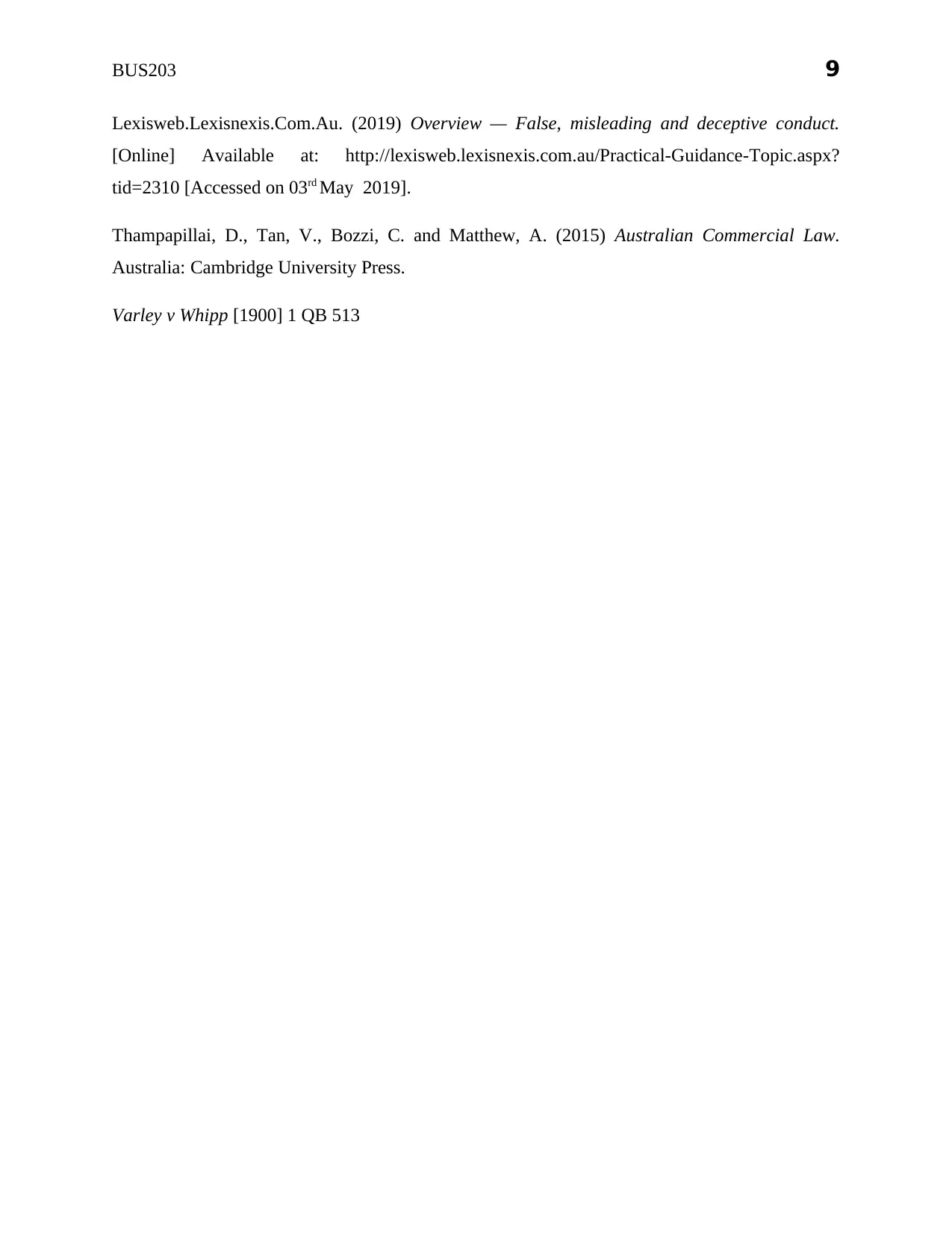
BUS203 9
Lexisweb.Lexisnexis.Com.Au. (2019) Overview — False, misleading and deceptive conduct.
[Online] Available at: http://lexisweb.lexisnexis.com.au/Practical-Guidance-Topic.aspx?
tid=2310 [Accessed on 03rd May 2019].
Thampapillai, D., Tan, V., Bozzi, C. and Matthew, A. (2015) Australian Commercial Law.
Australia: Cambridge University Press.
Varley v Whipp [1900] 1 QB 513
Lexisweb.Lexisnexis.Com.Au. (2019) Overview — False, misleading and deceptive conduct.
[Online] Available at: http://lexisweb.lexisnexis.com.au/Practical-Guidance-Topic.aspx?
tid=2310 [Accessed on 03rd May 2019].
Thampapillai, D., Tan, V., Bozzi, C. and Matthew, A. (2015) Australian Commercial Law.
Australia: Cambridge University Press.
Varley v Whipp [1900] 1 QB 513
1 out of 10
Related Documents
Your All-in-One AI-Powered Toolkit for Academic Success.
+13062052269
info@desklib.com
Available 24*7 on WhatsApp / Email
![[object Object]](/_next/static/media/star-bottom.7253800d.svg)
Unlock your academic potential
Copyright © 2020–2025 A2Z Services. All Rights Reserved. Developed and managed by ZUCOL.





